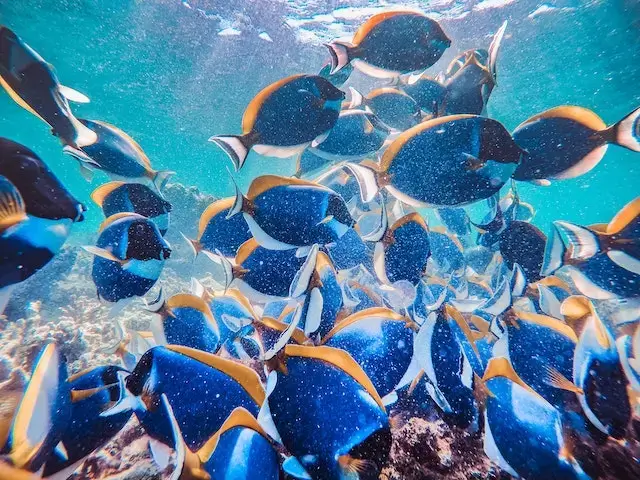Often we see a fish, be it out there in the water or their cozy home in our little aquarium, and we wonder how they think and feel about all that water they are swimming in.
Do they even know they are in the water? And then we wonder, is a fish wet in water? So, you, too, have been musing over this, haven’t you, so much that you have reached here browsing for answers.
Well, for once, we won’t be promising to give you an answer. You can read the below article, and then, since you’re smart, we know you’ll come up with the solution.
Is A Fish Wet In Water?

No, the rule is that nothing is considered wet underwater. A fish can be regarded as wet once out of the water, as a dry environment surrounds him.
So, a fish swimming in the water is ideally dry. At least, this is the general argument, the simple explanation being that the fish, when underwater, does not have water sticking to it like it would once it comes out of the water.
However, some say that technically, anything in the water is wet, as it is covered and submerged. And so, while the debate goes on, read on to learn about the fish in water.
What Does It Mean To Be Wet?
In simple terms, to be wet means to be covered with water or soaked with water. However, an object can be considered wet only when placed in a dry environment.
To be covered with water is to have water on the surface without penetrating it. To be soaked, on the other hand, is to have water penetrating an object through pores, fibers, you name it.
Either way, both conditions count for being wet. On the other hand, water, being liquid, is not wet but can make a solid substance wet.
Must Read: Why Is My Fish Swimming Fast Back And Forth?
Can Fish Sense Wetness?
No, a fish does not know that he is wet. This is their natural environment. In other words, a fish doesn’t know what it is to be dry. Being wet for them is something normal.
I hope that answers your question. And since we have more space here, here’s giving a little more exciting information.
Let’s begin by checking if you know the answer. What can a fish sense the best?
Give up? A fish’s best senses are those of taste and smell. So, while he can’t sense that he is wet, he can sense food coming. I hope that helps the angler or the aquarium lover in you.
How Do Fish Interact With Water?
This is how it is. Fish, like humans, need oxygen to breathe. However, here the oxygen is dissolved in water.
Unlike humans, fish don’t feel thirsty but still need water to survive. This is especially true in the case of saltwater fish that need to take in water through their m mouths lest they suffer insufficiency of water in their system. (more on this later)
Fish interact with water through a process called osmosis, which is nothing but the consumption of water. The fish, in truth, does not drink but absorbs water through its skin and gills.
It’s like this. The fish, like humans, will take in the water through the mouth. However, this water mostly gets filtered out of their gills. This is more so in the case of freshwater fish (you’ll see why soon)
Yet, this is similar to the drinking water process, as the water flows across a thin sheet to enter the fish’s membranes, providing the oxygen supply they need.
They also swallow some water, which goes out through the digestive tract. The water entering the fish’s membranes flows from areas with low concentrations to those with high, thus providing a balance to the fish’s entire body.
Can A Fish Be Dry?
They say a fish cannot survive without water. The truth is that they need to have at least some amount of water in their gills, lest they start to suffocate.
Fish generally breathe through water in their gills, which is why you sometimes see a fish out of the water, still alive. The fish will die as soon as it becomes dry.
In the end, since a fish spends most of its time underwater, it is left for you to decide, depending on whether you consider this wet or dry.
The only time when it’s dry is when it’s out and in your bucket. But is it dry at this time? Let’s see…
What Happens To A Fish’s Slime Layer When It Is Out Of Water?
Fish are slimy beings, and this icky coating is of great value to the fish, serving as a barrier to preserve all the necessary fluids and fight against disease. It maintains the ionic balance of the fish’s body. It also assists the fish in breathing through the skin, a process known as dermal respiration.
In other words, the slime layer on a fish has many protective qualities to preserve a fish’s body. By making the fish’s body slippery, it keeps away all parasites and pathogens that would otherwise harm the fish’s body, some of them to the extent of suffocating him.
You can say that the slime is like a bandage that spares the fish’s otherwise delicate and sensitive skin that is more prone to trauma and infection that could enter the fish’s body.
However, once out of the water, it sadly gets overrun with bacteria and other parasites that will, in time, kill the fish.
Like human beings, these creatures come with multiple layers of skin. These are known as scales on a fish and are covered by a thin layer called the epidermis. The epidermis contains several epithelial cells, which are responsible for the slime that we see.
Once lost, this slime can significantly damage the fish’s skin, which happens when all the parasites nest on the poor fish. At the same time, too much slime can kill poor fish, as it needs just the right amount of grime to stay healthy and alive.
Do Fish Drink Water?
Fish can swallow water, but whether or not they do it depends on the fish breed. Freshwater fish generally do not consume water as the water here could bring about an imbalance of the salt in their body.
Likewise, a saltwater fish will consume water for the same reason mentioned above. It maintains the balance of salt in their body.
A saltwater fish will need a little more water to maintain its system. The water they drink goes into their digestive tract, unlike freshwater fish, which mostly put it out through their gills.
This water goes ahead in providing the fish’s body with the required concentration of salt.
In other words, a freshwater fish continuously pumps salt in with its cells, while a saltwater fish constantly pumps it out. Observe a freshwater fish, and you will notice it is continuously urinating.
This is because their bodies contain more salt than fish that swim in salt water. As their bodies are saltier, they absorb a lot of water. And so, more than drinking, these fish spend more time getting rid of all that excess water.
Recommended Reading: What Color Is Stingray?
Final Thoughts
If only a fish knew how he is being so great a source of debate to humans here. And this would be even worse if he saw how, with all the discussion, we have yet to arrive at a final consensus.
He would agree that life is easier being a fish, and we would not argue with them.
Oh, fish, we don’t know whether you are wet or dry underwater, and since you don’t care either, we would instead end by being happy that you are happily swimming in it.
Frequently Asked Questions
Q1. Is something underwater wet?
Ans: This has today become a matter of debate. Some say nothing can be considered wet when in the water, while others argue that anything is wet when covered in water. So, we cannot say.
Q2. Are you wet while in water?
Ans: No, you are not wet while in water. If you go by the definition that anything covered with water is wet, then yes, you are wet. But if you want to agree with those who argue saying that you are wet only against a dry environment, then perhaps you are not wet.
Q3. Are you wet in a water argument?
Ans: Some say that as long as you come in contact with water, you are water. So, when submerged, you are wet. But others say that wetness can only exist when against a dry environment.
Q4. Is water wet?
Ans: Now, when you add water to water, does the water you add become wet? This is the argument that some go by to state that water isn’t wet. Yet, others say that water being a free fluid liquid, is 100 percent wet. Now you decide.



